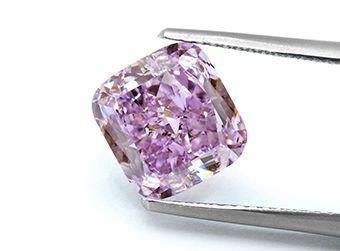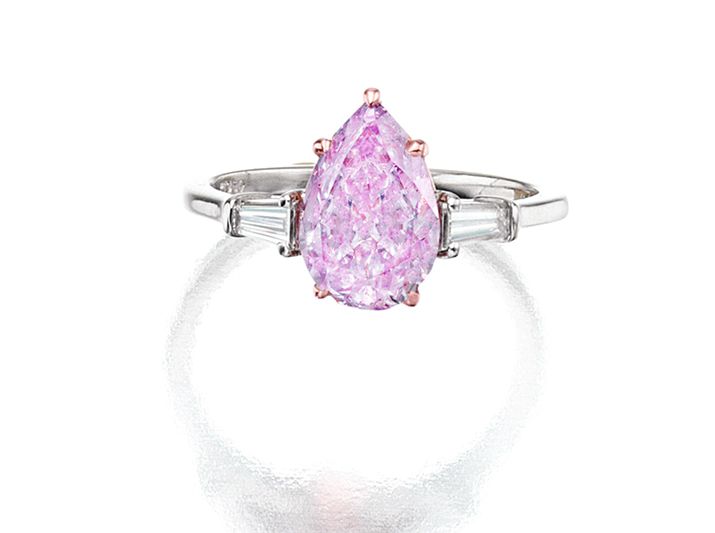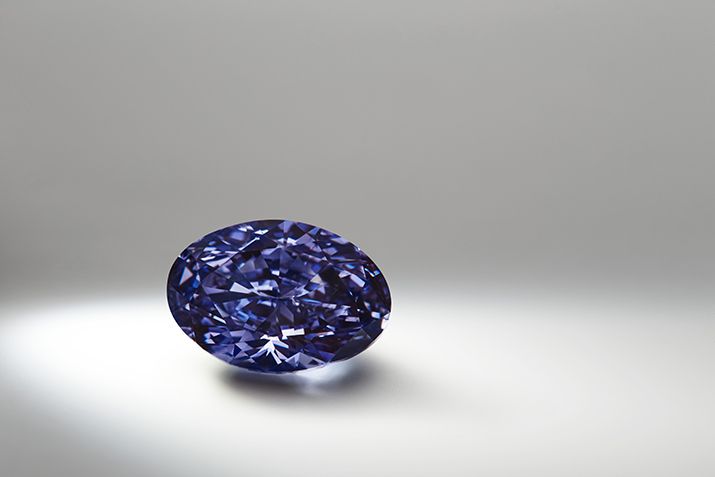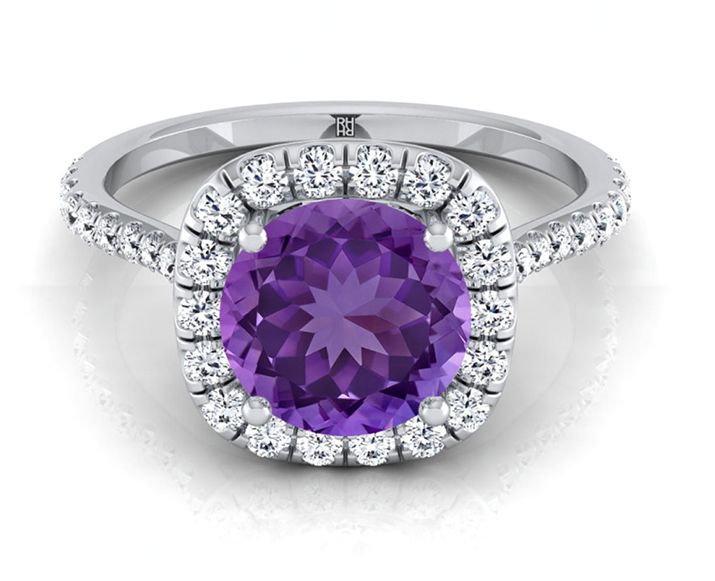Purple Diamond Quality Checklist
- Color origin: Natural
- Color Grade: Fancy
- Clarity Grade: SI
- Symmetry: Good to Excellent
- Polish: Good to Excellent
- Fluorescence: None to Faint

You may have heard of pink diamonds, thanks to some spectacular celebrity pink diamond engagement rings. And fallen in love with blue diamonds, thanks to the Hope Diamond and the movie Titanic. But you probably don't know much about purple diamonds, which combine the peacefulness of blue with the sweetness of pink.
That’s because purple diamonds and violet diamonds are exceedingly rare. In fact they are so rare that a pure purple diamond of only 1.99 carats recently sold at auction for $673,000.
Purple diamonds are so rare that the most common question asked about purple diamonds on Google is whether or not they exist. Yes, purple diamonds do exist! But treated and lab-grown purple diamonds are very much more common than natural purple diamonds.

The source of the natural color of purple diamonds is a bit mysterious. While some violet diamonds contain boron, which causes the blue color in diamonds, others have traces of hydrogen instead. Still others have structural anomalies in their crystals, similar to pink diamonds. But because purple diamonds are so rare, scientists can’t say for sure what causes this surprising color.
Technically, purple is a combination of blue and red. Violet is a wavelength in the spectrum that is shorter than blue but longer than ultraviolet. Although purple and violet are similar in color, when GIA grades fancy colored diamonds, they distinguish between the more reddish toned purple diamonds and more bluish violet diamonds. Purple is rarer, and generally more valuable, than violet.
Light purple diamonds can have lovely lavender, lilac, orchid and mauve colors that create beautiful purple diamond engagement rings.
Purple diamonds are for diamond collectors and connoisseurs, who may search a lifetime for a purple diamond with the most beautiful hue.

Only a few pure purple diamonds are found in the world each year. Purple diamonds have been found in South Africa.
Two mines in Russia, Yakutia and Arkhangelsk, have also produced a small number of diamonds with purple as their dominant hue.
The Argyle Mine of Australia is one of the only sources of violet diamonds. Most of the world's diamonds with a pure violet hue have been mined from Argyle. Yet less than 100 carats of rough violet diamond have been found in the entire history of the mine. Only 12 carats of violet diamonds have been offered in the 32 years of the Argyle Tender, which is the annual sale for the mine’s best quality fancy colored diamonds.
There are no truly famous purple diamonds. A 7.34-carat vivid purple diamond called the Purple Heart is probably the most well-known purple diamond but its current owner is unknown. A 3.37 carat purple diamond known as the Purple Orchid, the diamond featured at the top of this page, was offered for sale in Hong Kong with the asking price of $4 million in 2014. Its current owner and selling price are also unknown.
The Argyle Violet, a 2.83 carat fancy deep grayish bluish violet diamond in the 2016 Argyle tender is the largest violet diamond ever found in Australia.
Since purple is the color of royalty, purple diamonds are the ultimate regal gemstone. The meaning of purple diamonds is serenity, courage and honor.
The most important quality factor for purple diamonds is the saturation, or intensity, of the color. The GIA color grading scale for purple diamonds begins with Faint, Very Light, and Light and then continues into the coveted fancy purple colors: Fancy Light, Fancy, Fancy Intense, and Fancy Vivid. Fancy Deep or Fancy Dark may be used to describe diamonds that have a strong color but not as much saturation as Fancy Intense Purple and Fancy Vivid Purple diamonds. The price per carat jumps significantly between the Fancy Light and the Fancy color grades.
Purple diamonds are more often very light and pastel in tone, even with intense and vivid grades, and violet diamonds are more often deep or dark in tone.
Both purple diamonds and violet diamonds often contain modifying colors. Purple diamonds often are modified with pink or brown. Violet diamonds are often modified by gray or blue. The last color mentioned on a GIA report is the dominant color. The GIA uses an adjective for the color when the secondary color is slight and a noun for the color when it is more apparent. So a pinkish purple diamond is primarily purple with a slight modifying tone of pink but a pink purple diamond, although still primarily purple, has a more noticeable pink tint. Purple diamonds with brown secondary colors are worth less. In the world of fancy colored diamonds, small differences in color can result in large differences in the price per carat.
When you are considering purchasing a fancy colored diamond, it’s essential that the diamond is accompanied by a GIA Colored Diamond Grading Report. At RockHer, we never sell a fancy colored diamond without a grading report from GIA. GIA has graded virtually every significant fancy colored diamond on the market: only GIA’s description of a fancy diamond’s color is trusted by the market when it comes to pricing fancy colored diamonds.
Having a grading report from GIA also confirms that a purple diamond’s color is natural, that the diamond hasn’t been treated and that that the diamond is not laboratory grown.
Because purple diamonds are so rare and valuable, a gem with fine color may have eye visible inclusions and still be very valuable. Paler purple diamonds should be eye clean or free from distracting inclusions in the center.
Unlike colorless diamonds, which are most often cut into round brilliant cuts, purple diamonds are most often found in fancy shapes like oval cuts, cushion cuts, radiant cuts, pear shapes, and emerald cuts. That’s because the round brilliant cut tends to dilute the color of purple diamonds. Cutters will do everything they can to enhance the color, including making the girdle thicker or the proportions deeper. That’s because color is so important to the value of the diamond it overrules all other factors.
At RockHer we specialize in setting purple diamonds to maximize their impact. We always recommend setting a purple diamond in a rose gold setting. It will help to emphasize its rosy glow. Contrasting a purple diamond center gem with a colorless diamond halo can provide contrast to set off the color of a purple diamond center stone.
We can find you brownish purple diamonds and grayish violet diamonds that can be set to emphasize the purple in their color to give you the romance of the rare purple hue at a more affordable price.
Purple Diamond Quality Checklist

Love the look of a purple diamond but don't love the price tag? At RockHer, we are big fans of purple sapphire engagement rings. Sapphires are beautiful, rare, and durable gemstones that are much more affordable than fancy colored diamonds. And there are many more purples available, from pastel shades that mimic the look of a fancy purple diamond to more intense colors that would have a million-dollar price tag if you could match them in diamond. You may find the purple sapphire engagement ring of your dreams is more accessible than you thought it could be. Another alternative to purple diamonds is amethyst. This purple quartz gem is very affordable and available in fine purple shades that make a beautiful amethyst engagement ring.
The style of your engagement ring setting can make your purple diamond look more or less purple. Even if your diamond is light purple or fancy light purple, you can make the color look more saturated by doing two things. First, surround the diamond with rose gold prongs or a rose gold bezel. The entire basket that holds the diamond should be rose gold if possible. Then accent the ring with bright white diamonds in while gold or platinum. The reflection from the rose gold, combined with the contrast with the white diamond in platinum or white gold, makes a paler purple diamond look more intense.
The contrast effect means that halo purple diamond halo engagement rings are a popular choice. Three-stone engagement rings with a purple diamond center stone and white diamond side stones are another way to add contrast and make the color of your purple diamond look richer.
If you are in love with purple diamonds but a purple diamond center stone isn’t in your budget, you can add the romance of purple diamonds to your ring by adding a purple diamond halo to a colorless diamond center stone. We can also add small purple diamond accents to an eternity ring or wedding ring.